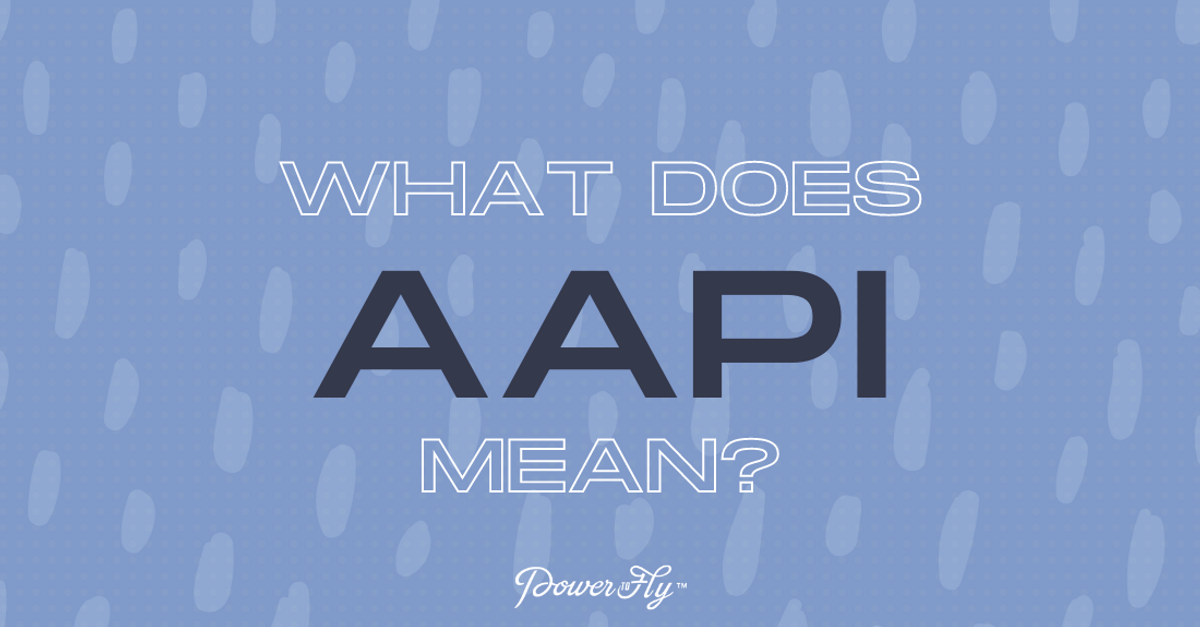May is Asian American and Pacific Islander (AAPI) Heritage Month, a time to celebrate the contributions that the AAPI community has had in the United States and the world!
But, who exactly are we celebrating? And how do we know we're using the term AAPI correctly?
That's exactly what we'll be unpacking in this article, along with the history of the term AAPI and how using the term might do more harm than good.
As always, our goal in this series is to empower you to lead and participate in efforts to make your own workplace inclusive and supportive of all talent. DEI is always evolving, and we're here to learn and grow right along with you. If you have other terms you'd like to see us cover after AAPI, leave a note in the comments or reach out at hi@powertofly.com!
Definition of AAPI
AAPI is an acronym that stands for Asian American and Pacific Islander and is an umbrella term meant to include all peoples with ancestry from the continent of Asia, Polynesia, Micronesia, and Melanesia. According to the Asian Pacific Institute, the term “Asian American” is meant to represent Americans who have origins in Southeast Asia, the Far East, and the Indian subcontinent.
It’s important to keep in mind that some Asian diasporas, namely people from Central Asia (i.e. Kazakhstan, Tajikistan, and Uzbekistan) and West Asia (i.e. Armenia, Cyprus, Georgia, Iraq, Israel, Saudi Arabia, Syria, Turkey, and UAE) may not identify as Asian.
AAPI is a relatively new term coined in hopes of moving towards progress and inclusivity, but it has also earned its fair share of criticism. Alongside it are its more simplified – and equally as controversial – forms: Asian Pacific Islander (API) and Asian Pacific American (APA).
History of AAPI
AAPI finds its roots in a student activism movement of 1968. In a time of social upheaval, graduate students Emma Gee and Yuji Ichioka took the opportunity to unite people of Asian descent by naming their student activist group Asian American Political Alliance. Gee and Ichioka’s group was the first to publically use the term “Asian American”.
With inequality and disunity raging, Gee and Ichioka’s broad term managed to unite those of Asian descent under a common goa. As a result, activists were strengthened by a newfound, yet intensely shared identity.
By the 80s, the term had expanded into Asian Pacific Islander (API) by the U.S. Census Bureau, extending the reach of this already broad umbrella term. It wasn’t until 1997 that the terms “Asian” and “Pacific Islander” were split, and the U.S. government finally chose to recognize the distinct differences between the two terms.
Controversy Over AAPI
While it served its purpose for the U.S. Census in the 80s, the term AAPI grouped together two very distinct identities, each with very distinct experiences, and has since garnered criticism from the Native Hawaiin and Pacific Islander (NHPI) community.
Despite it being an attempt at furthering inclusion, NHPI people are concerned that the term has blinded many to the struggles that Native Hawaiians and Pacific Islanders face. By grouping them in with another overarching identity term, many individuals in the community have found that their own experiences and identities have been muted.
NHPI people have also faced unique hardships in the shadow of colonization and oppression in the United States and North America that Asian Americans have not. Because of this, the socio-economic disparities further drive the two apart, with NHPI people falling sorely behind in terms of poverty and health rates. By merging the two groups together, there seems to be an erasure of the specific and pressing needs of the NHPI community.
Many believe that the only way to return to the path of true inclusivity is for Asian Americans and Pacific Islanders to be fully recognized as two separate groups. Because of this, there is a growing push for the disaggregation of the two identities.
When to use AAPI
When using any inclusive terminology, it’s always important to respect the preferences of those you are referring to. It’s not always inclusive to use an umbrella term like AAPI, especially considering the recent controversy surrounding it. Some may prefer more specific terms, like NHPI, Pacific Islander, Pasifika, or Asian American.
If you’re unsure of how to best refer to someone, just ask!
Self identities change from person to person, so it’s better to ask than assume. It shows the intentionality behind your words, and being intentional is one of the best forms of support for all communities!
Want to learn more about how to uplift those in the AAPI community? Check out our report on Uplifting AAPI Leaders here!




